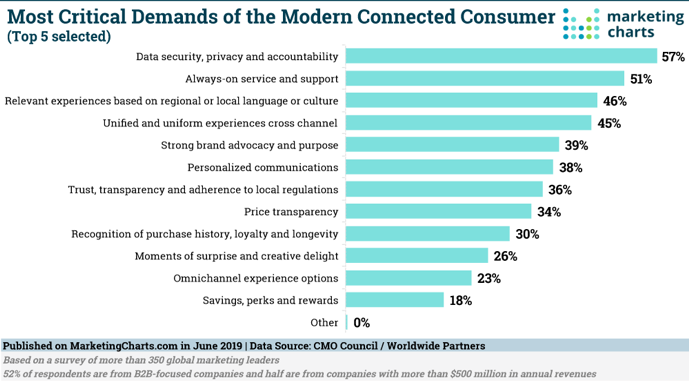The event industry is at the front line of a massive evolution in data handling and privacy. Meanwhile, the modern consumer demands (quite rightly) better data security, privacy and accountability from the brands they use. According to a CMO Council survey of global marketing leaders, 57% ranked this as a top critical demand by customers:

At the same time, our modern consumer expects a highly personal and relevant experience from their favorite brands; 46% of the respondents to the CMO survey noted this as a top priority.
These demands pose a massive challenge to brands; according to the report, just 20% of the respondents believe their organizations are completely prepared to deliver on these expectations. For the event industry, which of course relies heavily on data to create the online experience, it’s a wake-up call. Your event attendees are highly concerned with how and where their data is being used, and they expect us to be using their data to make their registration and engagement experience flawless.
The good news? Many event technology providers (including the ones we partner with to create end-to-end event solutions) are keenly aware of these demands … and are delivering event solutions that are fully compliant with best practices in data handling.
Data Security — Protecting the Lifeblood of Your Event
There’s an ironic twist to the use of data in the industry, especially as trends like facial recognition and artificial intelligence move into mainstream usage.
“Artificial intelligence and facial recognition is an upcoming tech that we’re seeing more in the use of event planning and large conventions. And that creates a whole other caveat of potential risks and other items to consider,” said Pinkerton vice president Jason Porter, as quoted by Isaac Carey in this Skift article. “When you have those technologies, it’s a deep rabbit hole you can go down.”
As the tech advances, so do the data compliance regulations like GDPR and the California Consumer Privacy Act. Event planners must now be at least cognizant of data privacy requirements, and ideally fluent in the language of compliance.
“Porter suggests that planners have a clear understanding of who owns the data being collected and how it will be disposed,” Carey writes, “and develop strict boundaries on how that data can and cannot be used.”
For event planners, this means maintaining ownership of your event and customer data. Don’t assume that your tech provider feels the same way. If their data policies aren’t clearly stated, ask them these direct questions:
- Do we own the data we collect on your system?
- Do you sell our customer information to third parties?
- Do you share our customer data for advertising purposes?
- Do you use our customer data for any purpose other than what we’ve asked you to provider?
- Are your data collection and handling procedures compliant with GDPR and the CCPA?
- Does your data collection and storage take place over secured channels, and is it encrypted in accordance with current best practices?
If you don’t like the answers you get, be concerned. A tech solution could become a massive liability for your event if it fails to provide adequate data protection.
Data and the Experience Your Attendees Demand
The second part of the challenge is this: how to use all that data entrusted to you to create a more compelling and relevant experience for the event attendee. This is where the science of data management dovetails with the creativity of event planning to truly engage those attendees. What does a “personalized” experience look like? In a nutshell, we want brands to know who we are, know our behavior, and engage with us on a platform we can trust.
- Know My Name — When we were brought on to work with AT&T Shape on their Developer Summit, the event team needed their attendees to be able to use their existing AT&T Shape developer credentials, so they could move from the marketing site to the registration platform and back as if it were one site. Other clients need to be able to sync registration logins to Microsoft, Facebook, Github, Google, LinkedIn, or other existing IDs. For internal events, you may want to limit registration access to employees only by authenticating SSOs using corporate credentials; or we can build a custom solution based on our client’s specific credentialing system.
- Know my behavior — In most of the companies we work with, event data falls under the realm of the marketing department. Yet it’s crucial your marketing data is able to “speak” fluently with your CRM. This is the only seamless way to make sure attendees receive accurate and relevant follow-up marketing. We know brands are collecting data on our every click. We expect them to know that, for example, we’ve already registered for an event. In our work with Zillow Group, their clients were invited to a personalized landing page that reflected the brand’s look and offered a seamless registration experience. Attendees automatically received accurate and relevant follow-up reminders from Zillow, and the sales team was able to maximize their efforts and build stronger client relationships.
- Keep my trust -— From that first email invitation or split-second glance at your event registration platform, potential attendees make snap judgments about your event, your brand, and how they feel about both. This is why a fully-branded registration site -— one that accurately reflects your corporate identity throughout the event experience — is critical. It keeps your brand personality strong and offers attendees a trusted brand experience. A good event tech provider will understand this, and be able to fully integrate your brand into the platform.
The modern consumer — and this means the modern event attendee — is absolutely right to be concerned about security and privacy. The event experience has become a nearly seamless blend of on-site and online experiences, and we expect to be safe throughout the experience. This demand will not ease; in fact I expect it will only increase. The solution? It starts with best practices in data handling, and using that data to make the user feel safe, secure and known.
If your event registration technology isn’t up to meeting these modern security and privacy demands, talk to us. We are all over it.



